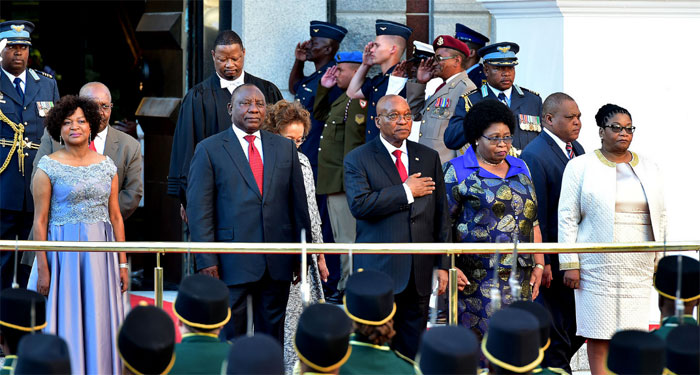
Johannesburg, South Africa | AFP | South African President Jacob Zuma’s sweeping cabinet overhaul exposes deep divisions between the ANC’s apartheid-struggle old guard and a new generation often accused of not living up to expectations.
Malusi Gigaba, 45, who replaced Pravin Gordhan, 67, as finance minister is a fervent Zuma loyalist always ready to defend the president despite corruption scandals and mounting legal troubles.
Gigaba, who was previously home affairs minister, is accused by the radical opposition EFF party of having “unexplained wealth” and was criticised for mismanagement at state-run South African Airlines during his time as public enterprises minister.
Gigabe’s new deputy, Sfiso Buthelezi, was linked to financial irregularities at the state rail operator in a report published by the country’s graft watchdog in 2015.
By contrast, Gordhan — who was an anti-apartheid activist from the 1970s to 1990s — enjoyed popularity rare for a finance minister and was seen as the “Mr Clean” of South African politics.
“Compared to past ANC leaders, Zuma falls far short — and he’s aware of it and extremely sensitive,” said political analyst Mari Harris of IPSOS South Africa.
“He’s tried to purge his cabinet of people who are opposition and put in a lot of yes-men.”
Thursday night’s power play has been read as a bid by Zuma to protect himself by controlling the transfer of power to a clique of favoured ANC figures.
Nkosazana Dlamini-Zuma, the president’s ex-wife and former African Union chief, is Zuma’s preferred candidate to succeed him when he steps down as the country’s leader in 2019.
She may be able to shield him from looming graft charges after he is out of office, but she has little support among the ANC’s electoral base.
Installing key Zuma loyalists will limit the likelihood that “old ANC” candidates like deputy president and ANC statesman Cyril Ramaphosa can halt Dlamini-Zuma’s bid to succeed the president.
Ramaphosa, who was instrumental in winning the support of global business for Nelson Mandela’s efforts to end white-minority rule, said that “there are quite a lot of colleagues and comrades who are unhappy”.
– ‘Post-apartheid failure’ –
Zuma himself was imprisoned on Robben Island with Nelson Mandela.
But Ramaphosa’s intervention highlighted a wider disconnect between ANC figures who were in the fight against apartheid alongside Mandela, and a new class of younger party leaders.
The bitter animosity between the two camps was laid bare at Wednesday’s funeral for celebrated ANC struggle stalwart Ahmed Kathrada which turned into an impromptu rally against the president.
In a fiery eulogy, former president Kgalema Motlanthe said Kathrada was “deeply disturbed by the current post-apartheid failure of politics”.
“He found current leadership wanting on many fronts,” said Motlanthe.
Kathrada had openly criticised Zuma’s government, which has been accused of corruption, mismanagement and of failing to transform the lives of black South Africans.
Quoting from a letter that Kathrada wrote to Zuma a year ago calling for him to stand down, Motlanthe received long and thunderous applause from mourners — including serving ministers.
The ANC’s Youth League — which is fiercely loyal to Zuma — lashed out at funeral-goers for using the event “for political posturing, point-scoring and grandstanding”.
In his final media briefing as finance minister, Gordhan told South Africans to revive the spirit of the anti-apartheid struggle and “organise” against political corruption and mismanagement.
“Do we expect more people to follow us out of the door? Well that’s a decision people must make,” he said.
Eurasia Group analyst Darias Jonker warned that the ANC conference later this year to choose Zuma’s successor as party chief would delay a major ruption for now.
“Severe divisions within the ANC are unlikely to lead to a formal split in the party this year, as both contesting factions — the ‘new ANC’ and the ‘old ANC’ — will first contest the December elective conference,” he said.
He predicted the the “new ANC” would retain party control but face a tough time from voters.
“The new ANC is likely to see support drop to below 50 percent in the 2019 election,” he said.
 The Independent Uganda: You get the Truth we Pay the Price
The Independent Uganda: You get the Truth we Pay the Price





